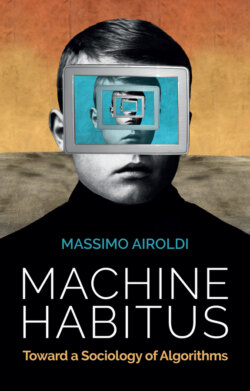Читать книгу Machine Habitus - Massimo Airoldi - Страница 17
Notes
Оглавление1 1 The status of artificial intelligence – whether it could ever become ‘general’, or is destined to remain a ‘narrow’ mathematical manifestation as in the case of current machine learning systems – is a debated issue that goes beyond the scope of the present work. For a non-technical overview, see Broussard 2018.
2 2 For an overview of AI systems and deep learning methods, see Kelleher 2019. For an introduction to music recommenders, see Celma 2010. Historical accounts and non-technical explanations of machine learning systems can be found in Pasquinelli 2017; Broussard 2018; Sumpter 2018; Natale and Ballatore 2020; and Mackenzie 2015.
3 3 Chen writes: ‘in 1983, CPU speed or frequency was 25 MHz. Assuming 1,000 CPU cycles correspond to making a decision on a Go board, it would have taken 31 minutes to make a decision about 361 × 360 × 359 = 46,655,640 possible moves back then. Today, a single CPU’s frequency is above 4 GHz, […] making it 160 times faster on the same algorithm – in this case, taking less than 12 seconds to make that same decision’ (2016: 6).
4 4 Since 2015, special issues on the critical study of algorithms have appeared in recognized social science journals such as the European Journal of Cultural Studies, Information, Communication & Society, New Media & Society, Technology & Human Values, Theory, Culture & Society, and more.
5 5 The concept of socialization has been at the root of sociological theory since its very beginnings, as a way to explain mechanisms of social reproduction. As Guhin, Calarco and Miller-Idriss (2020) note, the term has become increasingly contested in post-war American sociology. In fact, Parsons’ functionalist notion of socialization has been criticized for being a ‘downloading’ model of culture which downplays the centrality of social interaction. The concept was subsequently employed in different terms by authors such as Giddens, Foucault, Berger and Luckmann, Luhmann, and Bourdieu, and continues to bear theoretical relevance today.
6 6 For an account of the genesis of the concept of habitus and of its pre-Bourdieusian uses by authors such as Elias, Mauss, Merleau-Ponty and Panofsky, see Sterne 2003 and Lizardo 2004.
7 7 Deus in machina is a wordplay based on deus ex machina, or ‘god from the machine’ – originally indicating the mechanical systems used to bring onstage actors playing gods in the ancient Greek theatre. I must thank Mauro Barisione, who came up with it during our early email exchanges about this book project.
